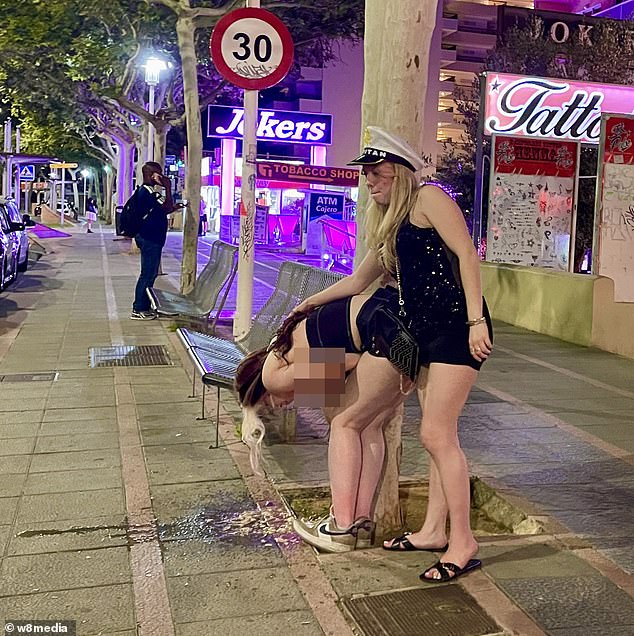Britain’s ambassador to Spain has urged British tourists in Magaluf to “show responsibility” amid Mallorca’s crackdown on alcohol-fueled tourists.
Hugh Elliott said UK tourists had to remember they were guests during their stay at the party resort.
During a visit yesterday to Calvià of which Magaluf is a part to publicize the ‘Stick With Your Mates’ campaign for responsible alcohol consumption, the diplomat stated: ‘Generally what we all want is responsibility.
‘During the holidays we all want to have a good time, right?, and especially young people.
‘It is about understanding what responsibility is, responsibility as guests because foreigners are guests here in Spain and in Calvià, it is a matter of knowing how to behave responsibly and have a good time.
“Tourism here is a type of tourism that values the destination.”
The British ambassador to Spain has urged British tourists in Magaluf to “show responsibility”
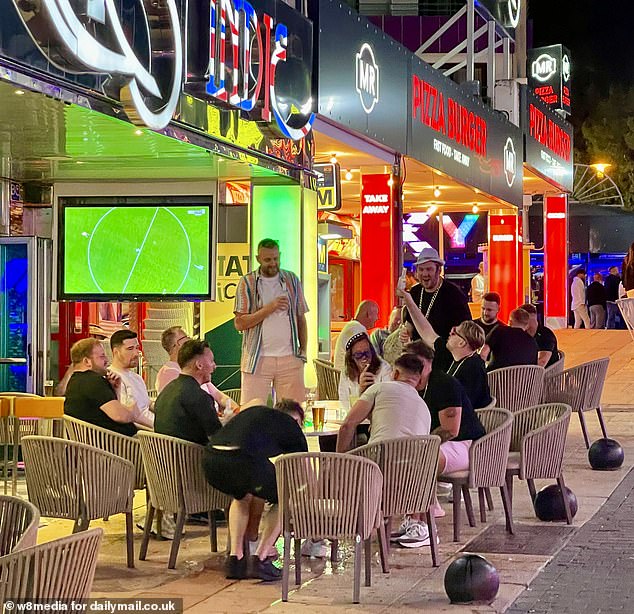
The British have long considered trips to the Balearic Islands a rite of passage.
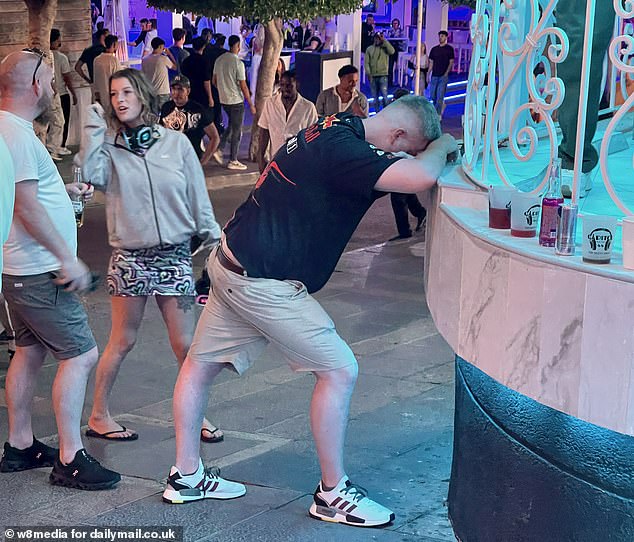
In a bid to toughen the islands’ 2020 legislation, shops selling alcohol in “excessive tourism” areas must now close completely between 9.30pm and 8am.
Elliott’s visit to Mallorca came less than a week after regional government chiefs announced a tightening of restrictions designed to curb drunk tourism, including forced nighttime closures of shops selling alcohol and fines of up to £1,300 for people caught drinking on the street.
The original alcohol measures, which were passed in 2020, included restrictions on the number of free drinks package holidays could offer, as well as new rules on public nudity and climbing on hotel balconies.
But under revised plans unveiled by the conservative People’s Party government, although the areas where alcohol restrictions are in place have been reduced, it is now illegal to drink on the street in those areas.
These new measures had the full support of the mayor of Calvià, Juan Antonio Amengual, who stated that they will make the island a safer place for everyone to enjoy.
The new laws will go into effect at least until December 2027.
Elliott said the key to the ‘Stick With Your Mates’ campaign, first launched in July 2019 by the British Embassy in Madrid and the British Consulate in Palma with the significant help of the friend of a Scottish pub worker who died six years ago in a The Fall of Magaluf, it was “having a good time but staying safe.”
He said: “We have seen that in the vast majority of cases, when young people have had accidents, sometimes fatal, it is because they were alone, hence the message ‘Stay with your mates’ because it is a way in which tourists can protect themselves and avoid problems.’
Elliott met during his visit with the mayor of Calvià, Juan Antonio Amengual, and subsequently held a meeting with some of the business associations that work in the area.
The city council later stated: ‘Last year ended in Magaluf with no deaths due to falls from hotels or apartments.
‘The campaign that is now being resumed aims, ultimately, to maintain this record among the thousands of young people who are already beginning to arrive in Magaluf.’
Georgia Hague started her own ‘Don’t Leave a Friend Behind’ campaign after Natalie Cormack died in April 2018 at the famous Eden Roc apartment block in Magaluf, where two other Britons lost their lives.
The 19-year-old, from West Kilbride, Ayrshire, remained undiscovered for several hours after losing her balance while trying to enter the flats and falling the equivalent of seven floors while moving along a ledge after discovering she was locked in. outside.
Georgia, from Welwyn Garden City, Herts, also played a major role in the ‘Stick With Your Mates’ campaign to raise awareness among young tourists about the importance of looking after each other when it was launched.
A video in which he appeared went viral and he is credited with helping prevent more deaths and accidents.
Business owners in Magaluf told MailOnline earlier this week that they were tired of the behavior of drunk British tourists and wanted to see more families in the resort.
Amendments announced last Friday to an existing 2020 regional government decree introduced to curb some of the worst tourist excesses have been marketed as part of a package of new measures designed to encourage “responsible tourism” in areas covered by the legislation , which include the city of Magaluf. famous strip of Punta Ballena.
There were already prohibitions on drinking on the street and on nightly sales of alcohol in stores.
The local media that reported four years ago on the ‘pioneering’ 2020 decree stated at that time: ‘The party is over. The Government of the Balearic Islands has approved these regulations to put a stop to excessive alcohol abuse in tourist areas.’
It comes after a series of crackdowns on several other Spanish islands as they battle overpopulation and huge tourism spikes.
Last week, a Menorca holiday town dubbed ‘Spanish Mykonos’ threatened to ban all tourists after previously telling them to only visit between 11am and 8pm so they could enjoy its breakfasts.
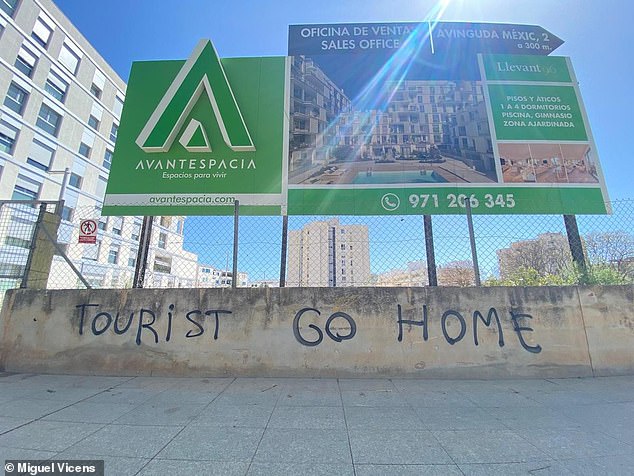
The words “Go Home Tourist” were scrawled in English on a wall beneath a property development sign in Nou Levante, Mallorca, a neighborhood that has seen a massive influx of foreign buyers in recent years.
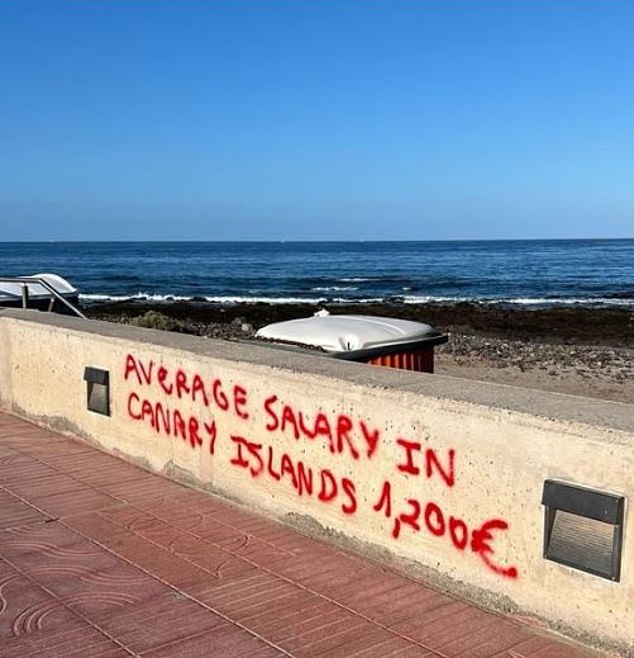
The Spanish islands are threatened by sea pollution, traffic jams and a lack of cheap and affordable housing linked to rising property prices due to Airbnb-style holiday rentals.
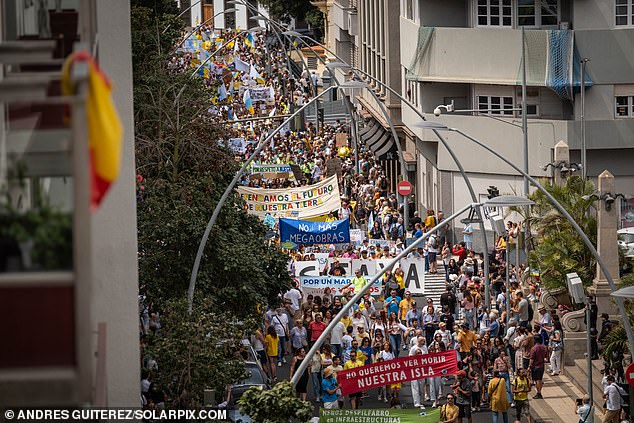
Protesters packed Weyler Square in Santa Cruz, the capital of Tenerife, the starting point of a march on the popular British tourist island, on April 20.
Ibiza also became the latest Spanish tourist destination to join the growing anti-tourism protests that have broken out across the country.
Protests have been seen in other popular destinations, such as Tenerife, where furious locals even went on hunger strike in an effort to express their anger.
In Menorca, graffiti has appeared on walls telling tourists to “go home” and stickers with the slogan “Don’t tag this beach, bitch!” They have been seen plastered around beach entrances in a bid to stop locals from sharing the island’s beautiful spots on social media.
Last year in Marbella the tires on cars with British registration were drastically reduced.
On April 20, thousands of protesters took to the streets of the Canary Islands to protest against the problems caused by mass tourism and demand their politicians take action.
The protesters chanted the slogan: ‘Canarias tiene un limit’, which in English translates to ‘The Canary Islands have a limit’.
Two weeks ago the same words appeared painted in white on the asphalt of one of the access roads to Teide in Tenerife.
Another message painted on the road read: “Moratoria turistica” – “Tourist moratorium” in English.


